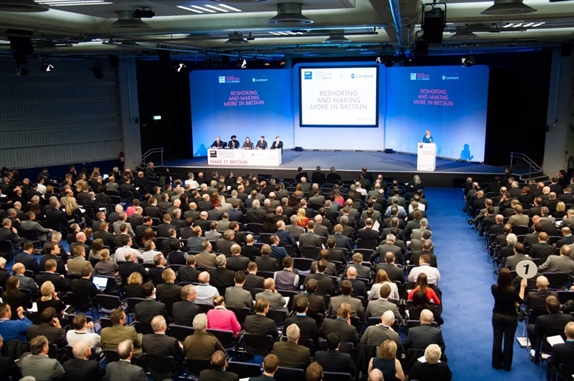
Returning manufacturing to the UK and exporting were two major themes of the recent Conference hosted by EEF, the Manufacturers Association.
Held at the QE II Conference Centre in London, the EEF launched the findings of its report “Backing Britain”, which revealed that one in six UK-based manufacturers surveyed had brought back production to the UK in the past three years – and a further 6% of respondents reported that they are planning to “reshore” in the next three years.
The event also featured a panel debate on the subject of “Reshoring and Making More in Britain”, featuring home textile company Caldeira and British chocolatier and cocoa grower, Hotel Chocolat, who have returned production to the UK from overseas. The main driver for the decision to reshore was confirmed as financial benefit, primarily due to rising labour costs in emerging markets, but also as a result of adverse fluctuations in exchange rates. Both companies also identified another critical benefit as greater agility to respond to customer demands, through shorter supply chains.
The reshoring theme was also covered by keynote speaker Dr Vince Cable, Secretary of State for Business Innovation and Skills, who affirmed the government’s commitment to support the return of manufacturing to the UK through its “Reshore UK” programme, a one-stop shop service intended to bring together sources of help for UK companies from various agencies.
Sessions on exporting saw a panel discussion featuring representatives from exporters of various sizes, ranging from BAE Systems, to a small business, and the acting Managing Director of UK Trade & Investment, Crispin Simon. The panel was quizzed about the government’s objective of doubling the value of the UK’s exports by 2020.
Interactive voting sessions – enabling delegates to provide real time opinions on a range of questions on manufacturing and exporting – were also included in the programme. Delegates expressed some scepticism about the government ability to achieve substantial export growth targets, highlighting the need for government to provide additional assistance to support exporters.
As the only professional body in the UK to offer accredited training courses in export, import and International Trade, The Institute of Export can help with whatever level of knowledge is required.
Visit our website for more information on the IOE’s business membership, training and qualifications or contact us on 01733 404400 if you have any questions.


